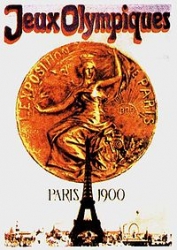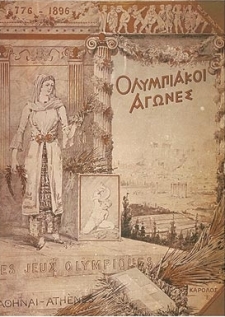Dave Watt presents the first article of a series of 3 concerning ‘strops and arguments’ in the olympics.
“May joy and good fellowship reign and in this manner, may the Olympic Torch pursue its way through ages, increasing friendly understanding among nations, for the good of a humanity always more enthusiastic, more courageous and more pure.”
– Baron Pierre de Coubertin, founder of the modern Olympics, Athens 1896
These noble sentiments expressed by de Coubertin in 1896 must have caused a certain amount of eye rolling and throat clearing, even at the first modern Olympiad, as he had just overcome a threatened boycott by the French Gymnastic Union which was incensed by the Germans being allowed to compete.
In addition, the Hungarians, part of the Austro-Hungarian Empire, paid their own travel costs and refused to take part as anything but native Hungarians under their own flag.
Irish athletes refused to compete as part of Britain and the Turks refused to take part at all, denouncing the Athens games as a tool of Greek expansionism in Asia minor.
The scene was thus set for over a century of huffs, strops, snubs, accusations and counter-accusations of sharp practice, boycotts, threats of boycotts and the international equivalent of the stamping of little feet and tossing of curls.
De Coubertin, having begun in the home of the original Olympiad, was anxious to take the second modern Olympiad to France. Unfortunately, to do this, he was obliged to run the 1900 games as part of the French world fair – the Exposition Universalle International (EUI) – whose chairman, Alfred Picart, stated tactfully that all sports were for morons. Consequently, the events were fitted in as and when the disaffected EUI officials felt like it, ran from mid May to late October and included bizarre sports such as fire-fighting, ballooning and pigeon shooting. (No, not clay pigeon shooting, real pigeon shooting).
The competitors had also to deal with their events being shunted off into wherever the EUI could find space and the swimmers, banished to the fast flowing River Seine, found their exceptionally fast times being offset by an interesting variety of unpleasant skin diseases from the heavily polluted river.
The 1900 Olympic Games also featured the first accusations of cheating when, during the marathon, Arthur Newton of the United States finished fifth but stated he had not been passed by any other runner during the race. Another American, Richard Grant, claimed he was run down by a cyclist as he made ground on the leaders.
Eventually, Frenchman Michel Théato crossed the finish line first and France took first and second place. The US was later to allege that Théato was actually from Luxembourg and held a passport for that country, so the stage was set for a certain amount of transatlantic friction over the event.
Despite the France/US acrimony it was, predictably, the German participation which set Gallic teeth on edge. The French president, Felix Faure, tried to keep the Germans out of the games and it was only persistent lobbying by de Coubertin and friends which ensured their participation.
However, having grudgingly accepted the presence of the evil ‘Boche’ at their games, the French went out of their way to make the German team feel as unwelcome as their means would allow.
The organisers refused to meet the German team at the station so that they were obliged to roam the city looking for their accommodation. They were not allowed to train on any French equipment and were not informed of the timings of sporting events, resulting in the sprinters arriving at the stadium as the gun went off for the 100 metre race.
One morning the Germans awoke to find that their hotel had been adorned with the words “Cochons – a bas la Prusse!” (Pigs – down with Prussia!) and, upon returning to the hotel in the evening, the team captain, Fritz Hoffmann found an enormous pile of excrement in his bed. His indignation at this was increased by, as he asserted,
“This being the work of several persons.”
Obviously, you didn’t get to be captain of a German athletics team in those days if you displayed any kind of milksop unwillingness to delve around a pile of turds on your counterpane in order to find how many culprits had been involved. I’d like to see Philipp Lahm try that one.
Things went slightly better for the Teutons in 1904 when the Olympics were held in St Louis in the US. Not only did eight of their ten entrants win medals, but their bedding was completely free of any solid wastes. The enormous US team – 432 of the 554 athletes were from America-predictably won most of the medals with twenty two golds, with two African Americans taking part for the first time.
However, an unfortunate sideshow to the Olympics were the Anthropology Games involving Africans, Asians, Filipinos and Native Americans, none of whom were eligible to appear in the Olympics proper as officials stated that, ”this type of man is hardly capable of Olympic calibre endeavour and, in any case, would hardly have understood the principles of amateurism.”
On the plus side for the Anthropology Games competitors, a local St Louis newspaper extolled their games saying :
“The meeting was a grand success from every point of view and served as a good example of what little brown men are capable of doing with training”.
Obviously, if heavy duty patronising was an Olympic event the US would have been well on the way to their twenty third gold medal.
The US contingent …. refused to dip their flag to the Royal Box
The relatively peaceful 1904 Olympics were followed by a dramatic change of venue from Rome to London in 1908 owing to a natural disaster on Vesuvius. There can’t have been many sporting events in history which have been cancelled owing to a volcanic eruption.
The opening parade at the White City was the usual brotherly fest when the Finns, whose land had been annexed by Russia in 1809, marched separately from the Russian imperial contingent and pointedly without a flag. The US contingent, full of Irish first and second generation athletes, refused to dip their flag to the Royal Box, one of their athletes having previously stated,
“This flag dips to no earthly king”.
Catcalls and boos from the pro-royal English crowd ensued and local newspapers later reprinted US pre-contest headlines containing such charmingly modest predictions as,
“American Athletes sure of success” and, “We will knock spots off Britishers.”
The scene was set for a transatlantic head to head tussle and a series of protests and accusations flew from both sides. The British accused the Americans of cheating in one of the heats for the 400 metres, the US runner was disqualified and his two team mates who had previously qualified withdrew from the final.
The British tug of war team, consisting of hefty Liverpool policemen, humiliatingly pulled the US team ‘over in a rush’ whereupon the Americans complained about their opponents heavy iron-reinforced boots which they referred to as ‘illegal equipment’.
In the marathon, the heroic Italian runner Dorando Pietri, leading the race by some distance, was so tired and disoriented by heat exhaustion that he ran the wrong way, fell down, got up, fell down again, was briefly treated by doctors and staggered to his feet stumbling towards the line, where he collapsed yet again.
They sportingly blamed this on the English weather
An Olympic official helped him up and half-dragged, half-carried him over the line where he collapsed once more. He was taken off to hospital and, while he lay in critical condition, the US lodged a protest which was upheld despite a national outcry around Britain.
The German team, one of the initial favourites for the medals, performed less well than they and a disappointed Kaiser Wilhelm expected, coming in sixth in the medals table. They sportingly blamed this on the English weather; London’s heavily polluted air and the ‘hopelessly biased’ British judges.
This was echoed by the US after the Olympic medal tally ended with fifty seven golds for Britain compared to twenty two for the US. John Sullivan, the head of the Amateur Athletic Union in the US referred to the British judges as ‘cruel, irresponsible and utterly unfair’.
President Theodore Roosevelt referred to ‘so-called British sportsmanship’ and initiated a ticker tape parade in New York for the returning Olympians at which a papier-mâché British lion was dragged behind, jeered at and pelted by the crowd.
All things considered, I think we’d have to give the first four Olympics a bit of a failing grade on de Coubertin’s hoped for,
“… increasing friendly understanding among nations.”

